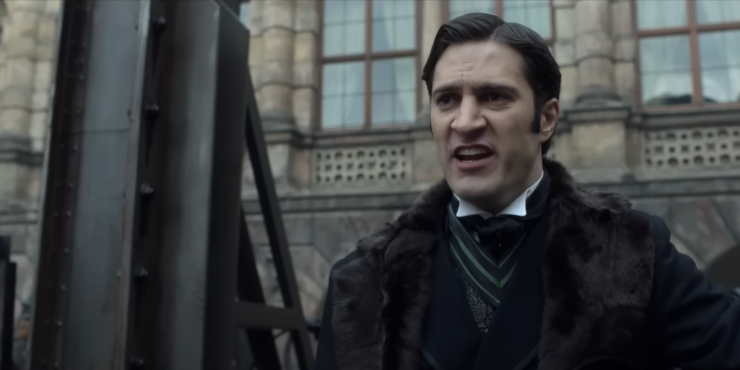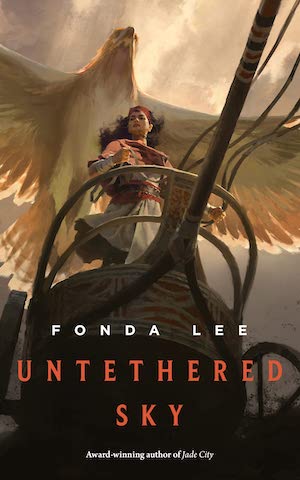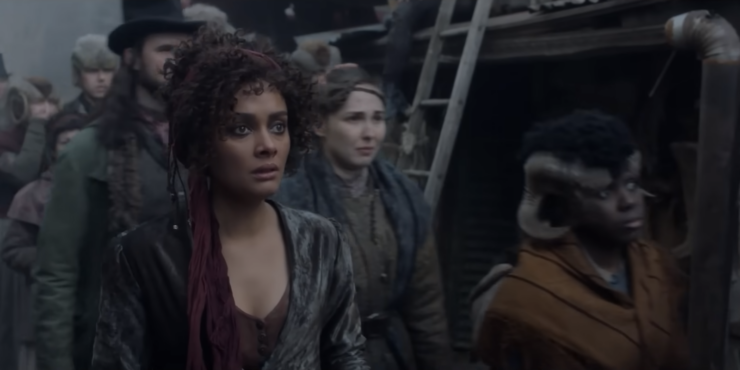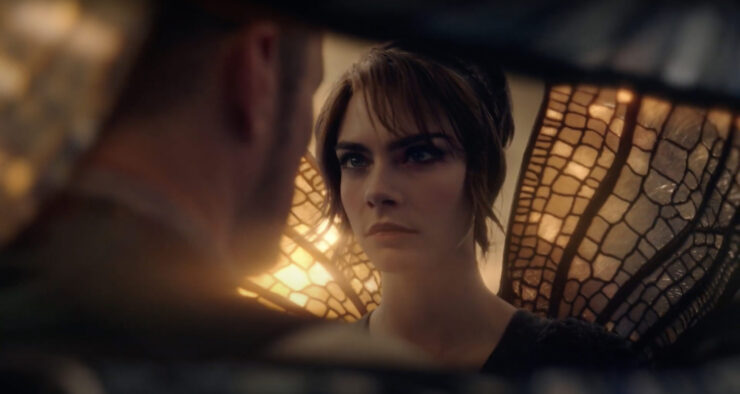After nearly four years, and a second season that faced numerous Covid delays, Carnival Row has just wrapped up for a second (and final) season—one that mostly justifies its existence while still suffering from a myriad of problems that leave a slightly sour taste in one’s mouth. For those of you who missed my coverage of the first season of the series, Carnival Row is a story about colonialism and race set in a fantasy world full of fey folk that looks a lot like Victorian England. It also has the silliest fantasy names of any show—with the leads being named Rycroft Philostrate (Orlando Bloom) and Vignette Stonemoss (Cara Delevingne). If those don’t make you at least slightly uncomfortable, there is also a recurring character named Constable Cuppins who is, somehow, not played for laughs.
Below, I’ll get into a lot of spoilers, so keep that in mind as we launch into it…
Squandered Potential and Pulled Political Punches

The problems with the show’s second season are, largely, twofold. The first is a continuing issue from its first season—the unfortunately middling performances of Bloom and Delevingne. A generous read would be that they are extremely miscast. Bloom growls every line as the half-fey ex-cop trying, unconvincingly, to make us see him as a gruff antihero even though his involvement in the show is predicated on two decades of being a go-to fantasy heartthrob. Delevingne never sells the core ruthlessness of a dispossessed freedom fighter caught between the man she loves and alleviating her people’s suffering. Those missteps lend a leaden quality to the majority of the scenes, making me wish that the series had chosen to focus on its more compellingly realized characters.
The second is a somewhat meandering plot that tries to show off the (admittedly rich and thoughtful) worldbuilding. Massive geopolitical events occur during this second season which have a ripple effect that touches characters in unexpected ways. For example, a bit of glad-handing surrounding an arms deal in the halls of parliament by some of the show’s elite power-brokers causes other characters to find themselves in the middle of a violent counter-revolution on a distant shore half a season later. This is all, in theory, great, save that the plotting of episodes on a moment-by-moment basis has the majority of its main characters caught up in tensions that never get a chance to play out. In that earlier example, for instance, those same characters caught in the counter-revolution are navigating the unstable social relationships of a newly communist state. The attack conveniently interrupts their plans to escape, making much of the previous episodes feel strangely irrelevant. Plot point after plot point are similarly interrupted and tossed aside, sacrificed in favor of advancing the season’s conspiratorial plot—a storyline whose ultimate resolution shows a strange betrayal of the show’s core values.
All of this is a shame insofar as the series has been incredibly ambitious. Not just in terms of its absolutely gorgeous set design, costuming, and makeup, but with regards to its desire to create a nuanced world with themes that explore the difficulties of protecting one’s loved ones while also attempting to end oppression. It ditches some of the tropes of Victorian fiction so ever-present last season in order to attempt to give its characters aggrieved and tortured complexity, but it rarely follows through with its set-ups:
- Runyan Millworthy (the inimitable Simon McBurney, who remains a highlight of the show’s cast), the theatrical impresario turned political advisor turned de facto Prime Minister makes terrible, compromising deals in an attempt to achieve a small amount of justice, but all of the minutiae and character development is kept off-screen in order build the mystery of what he has wrought.
- Agreus Astaryon (David Gyasi), the wealthy fey businessman whose relationship with a human woman (Tamzin Merchant) has led to his banishment from high society, reveals that he made his money by turning in fellow indentured servants attempting to escape but this thorny meditation on the moral cost of success serves only as fodder for an episode-and-a-half-long argument with his partner, after which, his indiscretions are never mentioned again.
- Sophie Longerbane (Caroline Ford), the leader of the opposition party in the Burgue’s parliament, attempts to play foreign powers against one another in order to secretly funnel money to the impoverished fey folk of Carnival Row while maintaining appearances as the leader of the anti-fey conservative party. But once she is discovered and executed halfway through the season by her would-be lover, Prime Minister Jonah Breakspear (House of the Dragon’s Arty Froushan), the repercussions of her actions vanish and all the loose ends of her plot never resurface.
- Even the Sparas, this season’s monstrous MacGuffin—a shapeshifting fey creature with a skeletal face and rows of teeth across its body—is given the adumbration of an interesting plot as one of the last surviving members of a species whose genocide was partially carried out by Philo. But this never gets any room to breathe because the plotting of the season requires their identity to remain secret until the very end.
Buy the Book


Untethered Sky
Much like the otherwise mostly excellent Penny Dreadful, whose final season was condensed into a relatively unsatisfying two-hour finale, Carnival Row feels like two seasons’ worth of plot crammed into ten episodes, moving so quickly from plot point to plot point that the characterization is pushed to the wayside and repeated character beats are cycled through endlessly (at least half of the episodes end with either Vignette or Philo imprisoned).
And all of this is without the ultimate disappointment of the aforementioned betrayal of the show’s politics. Heavy-handed as it may have been in its messaging throughout the first season, there was a nuance to Carnival Row’s characters and a laudable commitment to attempting to complicate its villains. In this second season, the nuance might be there for some characters, but the show pulls some of its biggest punches. Both seasons spend a lot of time on the ways in which working class cops are instruments of oppression against the feyfolk while also being oppressed themselves. By the end of the second season, however, the series provides a redemption arc for the virulently racist and spiteful Sergeant Dombey (Jamie Harris, the brother of fellow Carnival Row alum Jared Harris) despite his having facilitated a police riot in the finale. It’s not that bad characters should always lose, it’s that the show seems to suggest that, because he kills the worst of his beat cops in the midst of said riot, he is a character we should feel somewhat okay about.
Worst of all of it is its treatment of the New Dawn, a pan-species, communist revolution, led by Leonora, a faun maid turned people’s hero (played by Willow’s Joanne Whalley). Even with limited time, the movement is portrayed as singularly duplicitous and bloody-minded, pulling tropes from Cold War spy movies and generally condemning their methods in favor of incrementalism. It is a profound shame that, in a show which has spent two seasons selling its audience on the horrors of Imperialism, colonial subjugation, and wealth inequality, the scariest thing it can imagine is a socialist uprising. This is not to say that there isn’t room to meditate on the problems of creating a better world through violent revolution, but the show doesn’t bother to spend enough time on that aspect of it. Whalley’s performance is measured and thoughtful, but we don’t spend enough time with her to really understand if there is any character-driven justification for her decisions. Making her something of a cypher means that her final line about the seeds of future revolution having been already sown, even if she and her movement die, read more like a threat than the final act of a tragedy. It’s a bad look for a show that seems to understand the multifarious and complicated mechanisms of oppression.
Glimmers of Light

If it sounds like I despised Carnival Row, it’s because I have glossed over its best qualities up until now. It genuinely deserves to be lauded for the things it does well. Let’s start by saying that it is an uncommonly gorgeous show. It has a depth of production and costume design that rivals the best shows on television. It compares very favorably with gargantuan-budget fantasy epics like The Rings of Power and House of the Dragon and is so crammed full of visual details that it begs for repeated viewings. It also feels gigantic, with massive sets for the Burgue’s Parliamentary chamber, foundries and warehouses on Carnival Row, and the shattered, aristocratic homes of the New Dawn-occupied city of Ragusa. Its CGI sometimes falls short of those shows, but it’s used with relative restraint, only giving us full views of things like the unnerving Sparas, or the lupine Marrok towards the end of the season. Special acknowledgement is due to its makeup team, who have continued to do an incredible job making the faeries, fauns, trolls, kobolds, centaurs, and elves of its world look both fantastical and believable.
The specificity of implied cultures also feels delightfully realized as the series continues to crib from Victorian culture in ways that have not been done to death. In their final scene, Imogen Spurnrose repairs her lover Agreus’ mutilated horn with molten gold in an obvious nod to kintsugi—a burgeoning interest among artists and the upper class of the British fin-de-siècle as trade with Japan became more commonplace. Floral, gilded surcoats worn by the ambassador from the Pact (a sort of Russian/Italian mashup) feels very much in line with the filigreed Romanov finery that became a target for the Bolsheviks (who have an equivalent in the show’s New Dawn). A funeral service for the Prime Minister incorporates a snippet of scripture that discusses the ways in which the feyfolk spurned the redemption of the Martyr and are thus religiously unfit for mercy. At every turn, clever storytelling helps flesh out the world in immersive, thoughtful ways. Given that both Lord of the Rings and Game of Thrones have, as franchises, decades of history, invented culture, and concordance materials to draw from, it’s truly impressive that Carnival Row manages to feel equally as lived in and coherent.
And there are definitely things that the show gets right in its plotting and performances. Despite setting up Philo and Vignette as star-crossed lovers, the writers have Vignette end up with her true love, poet-turned-sex-worker-turned-Haruspex Tourmaline Larou (Karla Crome). It feels like a rare win for LGBTQ+ representation that the show allows its gay couple to be happy (and alive) in the end, despite the fact that the series spent much of its first season setting up its two, very famous, very attractive lead actors as a sexily tortured item. This is even more remarkable when the show doubles down on a purely platonic closeness between Tourmaline and Philo’s old army buddy, Darius (His Dark Materials’ Ariyon Bakare). Both Bakare and Crome are fantastic, despite having very little to do over the course of the season, and they join McBurney, Gyasi, and Merchant in being eminently watchable on screen even when the material they are given feels like it’s spinning its wheels. Moreover the show does seem, in some small respect, to recognize that Delevingne and Bloom are perhaps less interesting, given how much this second season feels more like an ensemble cast in terms of screen time.
There are great examples of media that attempt to give their audiences a window into complex systems that don’t have easy solutions. David Simon’s The Wire, for example, opined on the inability for meaningful reform in Baltimore’s drug and police ecosystem. N.K. Jemisin’s Broken Earth Trilogy is, among other things, a meditation on the ways in which individuals are almost never able to transcend the broken systems they were raised in. Even videogame franchises like The Last of Us (and its recent HBO adaptation), Dishonored, and Dragon Age are predicated on the idea that systemic oppression can’t be fought by lone, heroic individuals and that attempts to do so are almost always studies in tragedy.
What these stories have in common is an understanding that there is a middle ground between proscriptive, didactic answers to complicated questions and nihilistic inaction in the face of them. It is a narrow path to walk and one that requires a great deal of talent, both in front of and behind the camera to sell, but it can be done. If Carnival Row feels lacking, it is not because it didn’t strive to accomplish what those other stories did. It’s because it got the calculus of storytelling just a touch wrong. The series attempts to say something profound about systemic oppression, and in trying to give us a solution ends up advocating, at best, for incrementalism and, at worst, embracing the status quo.
Perhaps in a world where the show got a third season and this plot had been divided into two parts, it would have had the room to lend its characters the depth and nuance they needed to make its ending feel satisfyingly bittersweet and its politics more troubled—less neat and proscriptive. Of course, it would still have to contend with a pair of leads who, though plenty appealing and talented in other projects, always felt flat and miscast in the roles they were given.
Carnival Row is quite far from the worst big-budget Victorian fantasy show out there (that would be Joss Whedon and Philippa Goslett’s abysmal The Nevers—the only show that could go toe-to-toe with Carnival Row for weird, fake-sounding names). In an era when speculative fiction is very much in demand, I hope that this serves as proof that ambitious worldbuilding, thoughtful political analogues, and Victorian modes of storytelling have a place in the TV landscape. I’d much rather be disappointed by a show that never quite reached the heights it could have than one which was content with perfectly executed mediocrity.
But what did you think? Was this second season worth the wait? Did it exceed your expectations or fail to live up to them? Was I unduly harsh or, perhaps, not harsh enough? Let us know in the comments below.
Tyler Dean is a professor of Victorian Gothic Literature. He holds a doctorate from the University of California Irvine and teaches at a handful of Southern California colleges. He is the author of “Distended Youth: Arrested Development in the Victorian Novel” and his article “Exhuming M. Paul: Carmen Maria Machado and Creating Space for Pedagogical Discomfort” appears in the Winter 2022 issue of Victorian Studies. He is one half of the Lincoln & Welles podcast available on iTunes or through your favorite podcatcher. His fantastical bestiary can be found on Facebook at @presumptivebestiary.











I think many of the problems you identified might be solved by more seasons — not just to spell things out but because they got caught short — but I think this is it. As you say, lots to like even if it never quite gelled.
Well, I enjoyed the second season. I thought the positives out weighed the negatives. I would have enjoyed watching the third season.
I mostly agree with everything you said, Tyler.
At least we got a second season and an ending that managed to be uplifting without being saccharine –particularly for a show dripping with such grimdark vibes. But of course it was an extremely compressed season where nothing got enough room to breathe.
One particular character arc I enjoyed was Imogen’s. I was afraid she was going to end up regressing to her privileged ways, but instead we got a character that never stopped growing, and whose painful growth never feels anything but organic. And Tamzin Merchant played every moment and every nuance to the hilt. She is probably the actor in the series whose work I relished the most, and there were plenty of good performances –except, alas, Bloom’s and Delevingne’s.
That said,
It is a profound shame that, in a show which has spent two seasons selling its audience on the horrors of Imperialism, colonial subjugation, and wealth inequality, the scariest thing it can imagine is a socialist uprising.
That’s because it IS the scariest thing. As someone who lived through a revolution (back in Cuba), I can tell you as much. Which is why I did see Leonora’s character as tragic. She is not just some petty tyrant a la Fidel Castro –she is a true, passionate revolutionary who is not afraid to die for her beliefs, and who truly thinks the dream of a better future justifies the bloodbath she leaves in her wake everywhere.
I liked Carnival Row for the world building. I know there’s a comic, but doing as much as they did with 18 episodes is incredible, as are the sets, costume designs and the makeup.
I hoped that Vignette would end up with both Tourmaline and Philp, it was shown that faeries do polyamory.
I thought she might; I think Tourmaline even suggested it at one point.
Oddly enough, the names were one of the things I liked best. They aren’t ones you would encounter in our world, but there seemed to be an underlying logic that reflected the different cultures: lots of references to natural things in the Pix names, for instance. Or maybe I just have a tin ear.
Many of the plot lines do seem arbitrarily interrupted, but isn’t that how things actually happen? We get caught up playing our little games, and then something completely unexpected comes along and knocks the whole board over.
I found the chronology confusing at best. Some people take weeks or more to make a journey, and then someone else does it in a day or so.
Vignette and Philo should have ended up together, Tourmaline was a side hustle. A lot a time was spent on tension between Vignette and Philo which was never resolved and so to bring in Tourmaline as her preferred partner felt like a inclusive hat tip. It threw away a much better ending
I am so pleased with this analysis especially pointing out the cowardice and contradicting messaging of the new dawn turning villains. For the majority I thought the show was a refreshing stab at class consciousness and then they pulled that lazy treacherous crap. So disappointed and frustrated. But I’m glad to read not everyone I buying that heel turn
This really was a gorgeous show. Hoping the team responsible goes on to bigger and better.
Those character names were as bad as the two leads. As you point out, the show might have been saved had it been an ensemble show from the very start.
The New Dawn/Bolshevik aspect was overdone. But that first season scene where we see a painted wooden statuary of The Martyr (Carnival Row’s version of Jesus) hanging from a beam! Best depiction of an alternate religion in a long time.
@@@@@ 6 Jim Janney:
I LOVED the names as well. And yes, I thought they were a nice world-building touch.
@@@@@7 Colin:
THIS.
Plus, IMHO, Tourmaline ending up with Darius made much more sense. Or someone else of any gender. The whole “No more Philo, Tourmaline is my love!” thing happened in about five seconds. Plus it does reflect well on Vignette, who should have at least thought of somehow rescuing Philo, even if she did not want to stay with him.
This season had its disappointments, but I thought that the portrayal of the New Dawn was brilliant. You start with a shocking introduction that makes you think they’re just another communist bad guy faction. Then you move into the long seduction campaign where they point out countless legitimate grievances and provide examples of how their new system fixes them. They seed a few subtle warning signs (disappeared neighbors for example) which culminate in the corpse fields and the revelation that the entire goal of the New Dawn with regard to Imogen and Agreus was for the former’s access to Parliament and that everything else was just an attempt to get her on-side. The final reveals (the rash of murders was deliberately intended to foment hatred, the Parliament thing was just to force the members into one place to be slaughtered, and that the revolution was deliberately intending to get more fey killed during the riot to further stoke violence and to help the launch of the local revolution) were effective and leaned very heavily on the precedents of historical revolutionary movements (especially Marxist ones).
As most here seem to have, I, too, was very pleased with some things while not the happiest with others, and I agree with several things pointed out in the article and especially in the comments. Overall, count me in as one who enjoyed the show and would have watched a third season as well, had it ever been made.
(And based on our conversation, quite the same also applies to a friend of mine.)